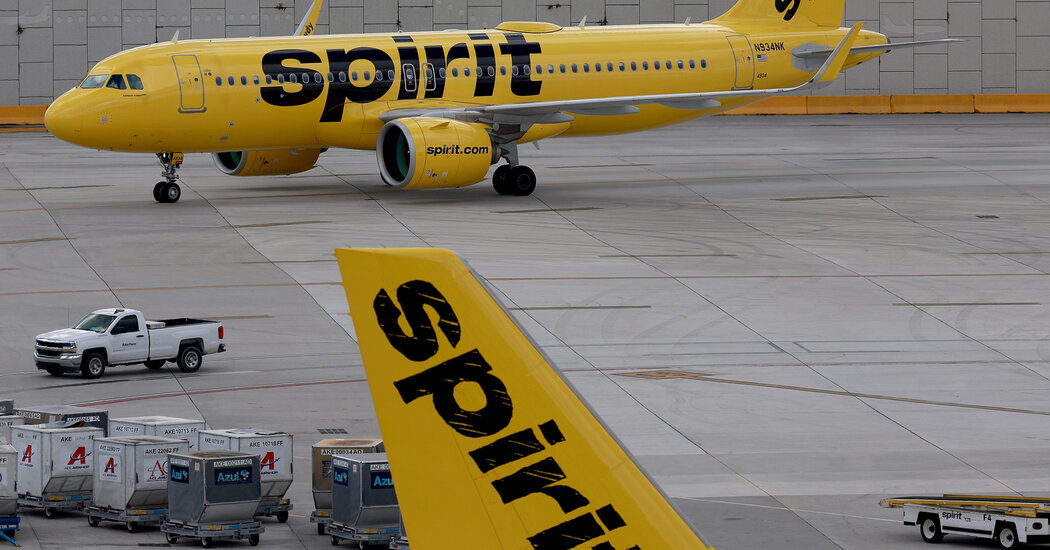Spirit Airlines rejected a takeover offer from JetBlue Airways on Monday, saying the proposal was unlikely to be approved by regulators.
In a letter to JetBlue, Spirit executives said they had determined it is unlikely that JetBlue’s takeover bid, which was updated on Friday, would gain regulatory approval as long as that airline’s recently announced partnership with American Airlines is in effect. used to be. The Justice Department and several states have filed a lawsuit to block that alliance, arguing it is anticompetitive, and JetBlue has said it will not give up on the partnership.
In a statement Monday, Spirit’s chairman of the board, Mac Gardner, said the company was sticking to its plan to merge with Frontier Airlines, a deal that predated JetBlue’s bid and which Spirit claimed would long-term interests of shareholders.
“After a thorough review and extensive dialogue with JetBlue, the board of directors determined that the JetBlue proposal poses an unacceptable level of foreclosure risk that would be accepted by Spirit’s shareholders,” said Mr. Gardner. “We believe that our upcoming merger with Frontier will open an exciting new chapter for Spirit and bring many benefits to Spirit’s shareholders, team members and guests.”
Spirit and Frontier, both low-cost carriers, announced a plan to merge in February. Then, JetBlue stepped in with a wider offering for Spirit, which surprised many analysts and aviation industry experts. Both deals would come under scrutiny from regulators of the Biden administration, who have expressed more skepticism about consolidation than their predecessors.
Some analysts argue that Spirit and Frontier are better suited to merge, as they operate under similar “ultra-low-cost” business models, but have more extensive flights in different parts of the United States. A JetBlue-Spirit combination can be more difficult to achieve because the airlines’ business models are very different. But the deal will allow JetBlue to compete more effectively with the country’s four dominant airlines.
JetBlue’s updated offering added a handful of concessions to address Spirit’s concerns about regulatory approval, including an offer to divest some of the assets of both airlines. JetBlue also said it would be committed to divesting Spirit assets in New York and Boston, markets that are at the heart of JetBlue’s partnership with American, known as the Northeast Alliance, in a bid to gain Department of Justice approval. JetBlue also said it would pay Spirit a $200 million fee if antitrust regulators prevent the deal from going through.
Spirit’s leadership responded Monday in a letter to the chief executive of JetBlue, saying they did not believe the updated offering had a reasonable chance of success. Regulators, Spirit said, would likely be “very concerned” about the prospect of JetBlue’s offerings resulting in higher costs and subsequently higher rates for consumers. Spirit said converting its planes, which are densely packed with seats, to the more spacious JetBlue configuration, for example, would lead to higher prices.
JetBlue said in response that both the offer and the Frontier deal shared “a similar regulatory profile,” but that Frontier had not offered to divest any assets or pay a termination fee. JetBlue also said the value of Frontier’s cash-and-stock deal had faded because of that airline’s declining stock price.
“Spirit shareholders would be better off with the assurance of our substantial cash premium, regulatory obligations and reverse termination fee protection,” JetBlue’s chief executive, Robin Hayes, said in a statement on Monday.
JetBlue also accused Spirit of not providing sufficient access to data on the low-cost carrier’s operations, while asking for “unprecedented commitments” from JetBlue.
For JetBlue, the US partnership and Spirit’s offerings provide opportunities to accelerate a planned expansion. JetBlue, which has long had a large presence at New York’s Kennedy International Airport, has been limited by gate availability at the region’s busy airports. In their partnership, JetBlue and American have agreed to sell each other’s flights, making connections between their frequent flyer programs and the pool’s takeoff and landing slots. It will also enable JetBlue, which primarily flies within the United States, to sell more international tickets on US aircraft.
A trial in the Justice Department’s case against the alliance is scheduled for late September.
Representatives from American and Frontier declined to comment on Monday’s developments, but Stephen Johnson, a top US executive, said during a meeting with investor analysts and reporters last month that a deal with JetBlue-Spirit would have no effect on the Northeast Alliance. “It doesn’t change the value we create for consumers in New York and Boston,” he said.


